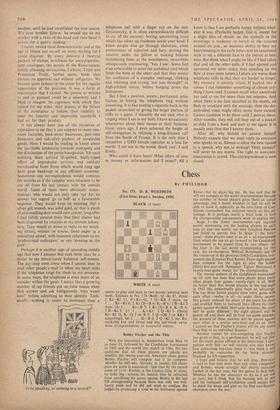Chess
By PHILIDOR
No. 175. D. R. WERTHEIM (First Prize, Israel v. Sweden, 1958) BLACK (4 men) WHITE (8 men) WHITE to play and mate in two moves; solution next week. Solution to No. 174 (Bull): Q—Kt 81, threat 2 Kt—Kt I I, PxKt=Q; 3 Q—KR 8 mate. (a) 1 . . . Kt—Kt 6; 2 Kt (2)—B 4; K—B 6; 3 B—Kt 2 mate. (b) 1 . . Kt—B 7; 2 Kt (3)-.B 4, K—B 6; 3 B—Kt 2. (c) 1 . . . K x Kt; 2 Q—Kt 5 (threat Kt—Kt 3), K—Q 5 or B 5; 3 Q-QB 5 or KKt 5 accordingly. (d) 1 . . . K—B 6; 2 Q—Kt 5, etc. Re- markable key and threat and fine self-block varia- tions. Congratulations to successful solvers.
• Bobby Fischer and the Title
With the Interzonal in Amsterdam from May 19 to June 23, followed by the Candidates tournament in 1965 and the world title match in 1966, the two questions that all chess players are asking are whether the twenty-year-old American chess genius Bobby Fischer will compete and if he competes whether he will win. Already, at twenty, US cham- pion six years in succession—last time by the record score of 114—Fischer is the Cassius Clay of chess; he talks big--,-witness his remark that he refrained from sacrificing his queen against Benko in the last US championship because there was only one bril- liancy prize and he did not want to confuse the judges by producing a rival to his brilliancy against Byrne—but he plays big too. He has said that he will not compete in the world championships because the number of Soviet players gives them an unfair advantage, but I doubt whether in fact he will be able to resist it, especially as the new form of Can- didates tournament has removed nearly all this ad- vantage. It is perhaps worth a brief look at how the championship tournaments work to explain this. Stage 1—the Zonal tournaments—are regional events winnowing out the leading players in each area all Over the world; our own Jonathan Penrose just failed to survive this. In Stage 2—the Inter- zonal—thege players meet in an all v. all tournament from which the top six go forward to the Candidates tournament to be joined there by two others: (a) the loser in the last world championship (in this case, the ex-champion, Mikhail Botwinnik) and (b) the runner-up in the previous (1962) Candidates tour- nament (the Estonian Paul Keres). These eight players then compete for the right to play the holder (thirty-five-year-old Armenian Tigran Petrosian) a twenty-four-game match for the championship. The normal pattern of the Candidates tournament up till now has been that every player plays every other player four games--twenty-eight in all. With no fewer than five Soviet players in the last eight in 1962 this undoubtedly gave them an advantage. The top three Soviet players drew every game with each other—twelve in all—in under thirty moves; this greatly reduced the strain of the event for them and enabled them to husband their efforts for their garnes against the field. Next year, however, the event will be quite different: the eight players will he paired off and there will be four ten-game matches; the winners of these matches will be paired against each other in a similar semi-final and so on. NOW I cannot see that Fischer's chance will be any worse than that of an individual Russian.
Another reason for non-competing that Fischer has given is that, as a professional; he will not play for the small prizes offered in the Interzonal. I sYn1" pathise with this—so will anyone else who knows how exhausting top-class chess is—but think it will probably be overcome by his being privately financed by US supporters. I hope and believe that he will play; Petrosian is said to fear him more than any other competitor and Bobby, whose strength has clearly increased further in the last year, has the genius to beat hirn,. Whether he has the character to do so I am no'. so sure;, but I think that his burning will to son and his increased self-confidence could enable him to stand the strain and give us the first non-Russian champion since the war.






































 Previous page
Previous page